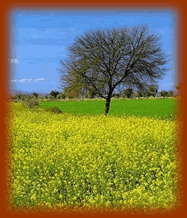
Saraswati, goddess of learning
Artharva-veda* XII.1.1
Vasant Panchami is the festival dedicated to Saraswati, the Hindu goddess of learning. Celebrated on the fifth lunar day of the month of Magh, it usually occurs during January or February.
In India, schools are closed for the day, allowing students to participate in the festivities in the temple. Considered to be a particularly auspicious day for the beginning of learning, parents often choose this day to teach their children their very first words.
*Veda, a Sanskrit word meaning ‘knowledge’, in this instance applied to the sacred knowledge of the Hindu religion. There are four collections (samhita) in the Veda: Rig-veda, Sama-veda, Yajur-veda and Artharva-veda.

Mustard fields, Pakistan
Vasant means ‘spring’, and the yellow worn by everyone on this day—including temple images of the goddess herself—symbolise the ripening of crops, most particularly the fields of flowering mustard, as in this picture of a field in Pakistan. Yellow sweets are exchanged, and the addition of saffron ensures that even the food appears laden with pollen.
This spring festival was adopted by Muslims during the 12th century, and at one celebration during the reign of the Mughal emperors, thousands of mustard coloured paper balloons, each containing a lit candle, were released into the air. Perhaps it was this practice that lead to the modern-day kite-flying contests that occur at this time.